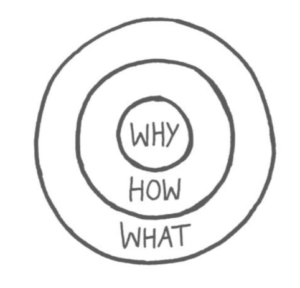Brand positioning…why?
In today’s crowded plant-based landscape, the idea of carving out a unique brand and narrative can be daunting. With new products coming out so frequently in this space, how can a young company ever hope to differentiate itself effectively? We take a page out of Simon Sinek’s famous TedTalk.
There are several approaches not to take when examining this question, such as trying to “fit in” based upon what’s already in the market or playing a game of one-upmanship with competitors. Even starting with your value proposition, a seemingly compelling factor, can lead you down a surface-level path. Because doing so is, in essence, starting from a sales perspective. What does our product do for you? X, Y, and Z. Buy it.
 But starting from any of these points – how your company is better than the competition, what your product offers, and so on – is a recipe for foggy and muddled positioning. These factors will be the results that come from your positioning, not the basis of it.
But starting from any of these points – how your company is better than the competition, what your product offers, and so on – is a recipe for foggy and muddled positioning. These factors will be the results that come from your positioning, not the basis of it.
Where, then, should you start? Positioning, whether in a crowded or empty category, should always begin with a simple question: Why?
Fleshed out, that question is really: why does this company exist? Why does it matter if it succeeds or fails? And why should someone really leap for this company’s products versus those sitting next to them on the shelf? By answering these questions – that is, by defining your brand’s purpose – you will come away with an unparalleled level of clarity and direction.
Take Oatly as an example.
On the back of their oatmilk carton, the company says, “We have been making oatmilk for more than 30 years. It was something our scientists developed in their search for the optimal way to combine nutritional value with sustainability, without using animals as a source.” There, simply put, is Oatly’s “why.” Why do they exist? It’s not to create phenomenal oatmilk products. That’s how they accomplish it. Their why is to make nutritious, sustainable products without using animals. And on a fundamental, gut level, a customer can resonate with that.
When customers are able to look at a brand and connect on the “why” level, something unique happens: trust. People can be hammered over the head with the benefits and features of a product again and again, and still not want to buy it. They understand what the product is and does for them, but that is not usually enough to keep them coming back. Consumers may certainly try new things, and purchase a product simply because of its benefits. But that doesn’t engender brand loyalty. Because there will *nearly* always be another brand that offers products that are similar in their features and benefits, and without a distinguishing “why,” those products will be used interchangeably.
Positioning is a powerful thing. Most importantly, it is the brand’s internal north star. It ensures alignment of decisions and guides a company through thick and thin. It creates deep clarity and authenticity. A powerful result of positioning is that customers understand what your brand is and is about, and will want to engage with it for years to come. Begin with the question, “why do we exist?” and the competitive edge, customer loyalty, and sales will follow. To learn more about discovering your “Why”, read more here.
Join a community of entrepreneurs who are growing their WHY
Are you positioning a plant-based brand? Sign up for our Master Class to learn more about the ins and outs of positioning and a range of other invaluable topics for a startup’s successful launch and sustained growth. Our live, interactive series will give you access to experts with decades of experience and a community of entrepreneurs that are also working to build the plant-based economy. Our guest speaker on brand positioning is David Swintosky – you won’t want to miss this session!







